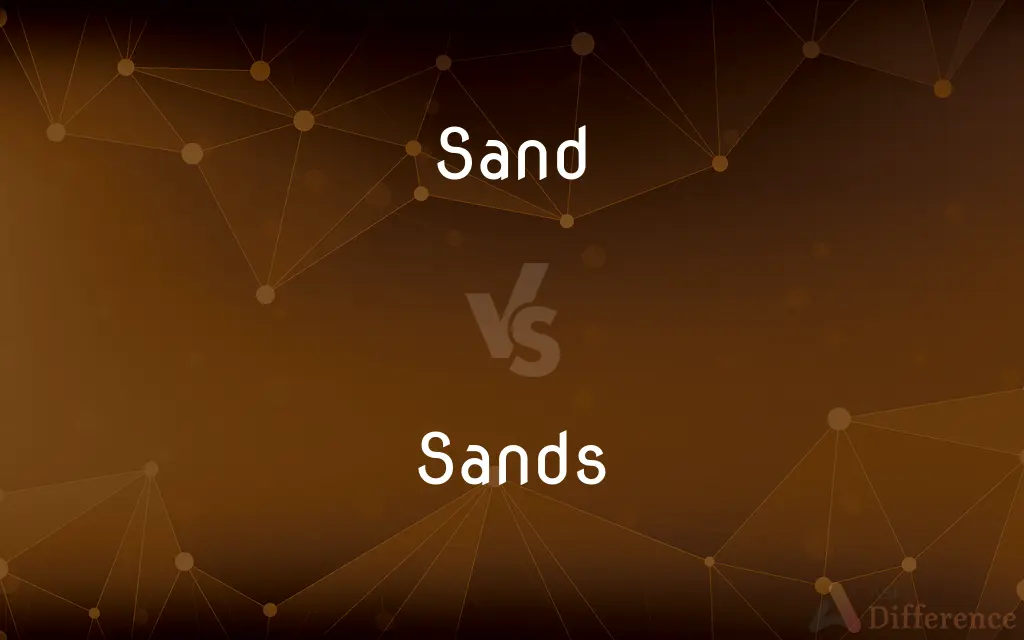Sand vs. Sands — What's the Difference?
Edited by Tayyaba Rehman — By Urooj Arif — Updated on March 31, 2024
Sand is commonly referred to in singular form when discussing its material as a collective noun, while "sands" often emphasizes multiple types or locations of sand.

Difference Between Sand and Sands
Table of Contents
ADVERTISEMENT
Key Differences
Sand, a granular material composed of finely divided rock and mineral particles, is used in various contexts, from construction to leisure. It is considered a singular noun when referring to the substance collectively, such as in discussions about beaches or deserts. On the other hand, the term "sands" is plural and is typically used to highlight diversity or specify different types or locations of sand. It implies a variety within the context, like the distinct characteristics of sands from various beaches around the world.
Sand serves as a fundamental material in construction, providing strength and stability to concrete and mortar. Its singular form underscores its role as a uniform, bulk material essential for building structures. Whereas sands, in plural form, might be discussed in terms of their unique compositions, colors, and textures, which are significant for scientific, environmental, or artistic considerations. This distinction underscores the variety inherent in sand from different sources.
In environmental studies, sand is analyzed for its role in coastal ecosystems, emphasizing its importance as a singular entity that supports biodiversity and protects shorelines from erosion. Meanwhile, the study of sands can lead to insights into geological history and climate change, as variations in sand grains from different locations can reveal much about past environments and processes.
Comparison Chart
Definition
Singular noun for collective material
Plural noun emphasizing variety or locations
Usage
General reference to the material
Specific reference to types or places
ADVERTISEMENT
Context
Construction, leisure, ecosystems
Art, science, environmental studies
Implication
Uniformity, bulk material
Diversity, distinct characteristics
Significance in Discussion
Fundamental, essential role
Variation, detailed analysis
Compare with Definitions
Sand
Fine particles of crushed rock.
The construction site needed more sand for the concrete mix.
Sands
Different types of sand.
The artist used sands from various beaches for her collage.
Sand
Component of deserts.
The camel trekked across the vast expanse of sand.
Sands
Varied textures and colors.
The brochure highlighted the unique sands of each island.
Sand
Geological study subject.
The geologist examined the sand to understand the area's history.
Sands
Specific locations of sand.
The sands of the Sahara Desert are known for their vastness.
Sand
Beach material.
The child played in the sand by the water's edge.
Sands
Geological variations.
Studying the sands of different regions can reveal much about the Earth's past.
Sand
Filtration medium.
The water filter uses sand to remove impurities.
Sands
Collection of sand samples.
His collection included sands from over fifty countries.
Sand
Sand is a granular material composed of finely divided rock and mineral particles. Sand has various compositions but is defined by its grain size.
Sands
Small loose grains of worn or disintegrated rock.
Sand
Small loose grains of worn or disintegrated rock.
Sands
(Geology) A sedimentary material, finer than a granule and coarser than silt, with grains between 0.06 and 2.0 millimeters in diameter.
Sand
(Geology) A sedimentary material, finer than a granule and coarser than silt, with grains between 0.06 and 2.0 millimeters in diameter.
Sands
Often sands A tract of land covered with sand, as a beach or desert.
Sand
Often sands A tract of land covered with sand, as a beach or desert.
Sands
The loose, granular, gritty particles in an hourglass.
Sand
The loose, granular, gritty particles in an hourglass.
Sands
Sands Moments of allotted time or duration
"The sands are numb'red that makes up my life" (Shakespeare).
Sand
Sands Moments of allotted time or duration
"The sands are numb'red that makes up my life" (Shakespeare).
Sands
(Slang) Courage; stamina; perseverance
"She had more sand in her than any girl I ever see.
In my opinion she was just full of sand" (Mark Twain).
Sand
(Slang) Courage; stamina; perseverance
"She had more sand in her than any girl I ever see.
In my opinion she was just full of sand" (Mark Twain).
Sands
A light grayish brown to yellowish gray.
Sand
A light grayish brown to yellowish gray.
Sands
To sprinkle or cover with or as if with sand.
Sand
To sprinkle or cover with or as if with sand.
Sands
To polish or scrape with sand or sandpaper.
Sand
To polish or scrape with sand or sandpaper.
Sands
To mix with sand.
Sand
To mix with sand.
Sands
To fill up (a harbor) with sand.
Sand
To fill up (a harbor) with sand.
Sands
Plural of sand
Sand
(uncountable) Rock that is ground more finely than gravel, but is not as fine as silt (more formally, see grain sizes chart), forming beaches and deserts and also used in construction.
Sands
Sand grains, especially in reference to the contents of an hourglass, from which
Sand
A beach or other expanse of sand.
The Canadian tar sands are a promising source of oil.
Sands
(figuratively) a unit of time.
The sands of a lifetime are rapidly running out.
Sand
Personal courage.
Sands
(figuratively) a desert
We were lost in the sands of Arabia.
Sand
A particle from 62.5 microns to 2 mm in diameter, following the Wentworth scale.
Sands
The region of the shore of a lake or sea or ocean
Sand
A light beige colour, like that of typical sand.
Sand
A single grain of sand.
Sand
A moment or interval of time; the term or extent of one's life (referring to the sand in an hourglass).
Sand
(colloquial) A sandpiper.
Sand
Of a light beige colour, like that of typical sand.
Sand
(transitive) To abrade the surface of (something) with sand or sandpaper in order to smooth or clean it.
Sand
(transitive) To cover with sand.
Sand
To blot ink using sand.
Sand
Fine particles of stone, esp. of siliceous stone, but not reduced to dust; comminuted stone in the form of loose grains, which are not coherent when wet.
That finer matter, called sand, is no other than very small pebbles.
Sand
A single particle of such stone.
Sand
The sand in the hourglass; hence, a moment or interval of time; the term or extent of one's life.
The sands are numbered that make up my life.
Sand
Tracts of land consisting of sand, like the deserts of Arabia and Africa; also, extensive tracts of sand exposed by the ebb of the tide.
Sand
Courage; pluck; grit.
Sand
To sprinkle or cover with sand.
Sand
To drive upon the sand.
Sand
To bury (oysters) beneath drifting sand or mud.
Sand
To mix with sand for purposes of fraud; as, to sand sugar.
Sand
A loose material consisting of grains of rock or coral
Sand
French writer known for works concerning women's rights and independence (1804-1876)
Sand
Fortitude and determination;
He didn't have the guts to try it
Sand
Rub with sandpaper;
Sandpaper the wooden surface
Common Curiosities
Is sand renewable?
Sand is considered a non-renewable resource due to its slow formation rate and high extraction rate.
Can the color of sand vary?
Yes, sand can be white, black, pink, or any color, depending on the minerals it contains.
What is sand used for?
Sand is used in construction, landscaping, and as a natural habitat in ecosystems.
Why is the plural "sands" used sometimes?
"Sands" emphasizes variety, such as different types of sand or sands from multiple locations.
How does sand contribute to water filtration?
Sand traps and filters out impurities, making it essential for water purification systems.
How does the texture of sand vary?
The texture of sand can vary widely, from fine to coarse, depending on its composition and origin.
What is the significance of sand in ecosystems?
Sand supports biodiversity and provides a critical habitat for various species.
Are all sands suitable for construction?
Not all sands are suitable for construction; their suitability depends on their composition and grain size.
Can sands be artificial?
Yes, artificial sands are produced to meet the demand in areas where natural sand is scarce.
Why is the study of sands important in art?
Artists use sands of various colors and textures to create unique works, exploring the material's aesthetic qualities.
How are sands studied scientifically?
Sands are studied to understand geological history, climate changes, and environmental processes.
What makes sands from different locations unique?
Sands differ in composition, texture, and color, reflecting their geological and environmental origins.
What challenges are associated with sand extraction?
Excessive sand extraction can lead to environmental degradation, including habitat destruction and erosion.
Why is sand important for beaches?
Sand plays a vital role in protecting coastlines from erosion and supporting marine life.
What role does sand play in the construction industry?
Sand is a key ingredient in concrete, mortar, and asphalt, providing strength and durability to structures.
Share Your Discovery

Previous Comparison
Precess vs. Process
Next Comparison
Capability vs. FunctionalityAuthor Spotlight
Written by
Urooj ArifUrooj is a skilled content writer at Ask Difference, known for her exceptional ability to simplify complex topics into engaging and informative content. With a passion for research and a flair for clear, concise writing, she consistently delivers articles that resonate with our diverse audience.
Edited by
Tayyaba RehmanTayyaba Rehman is a distinguished writer, currently serving as a primary contributor to askdifference.com. As a researcher in semantics and etymology, Tayyaba's passion for the complexity of languages and their distinctions has found a perfect home on the platform. Tayyaba delves into the intricacies of language, distinguishing between commonly confused words and phrases, thereby providing clarity for readers worldwide.















































